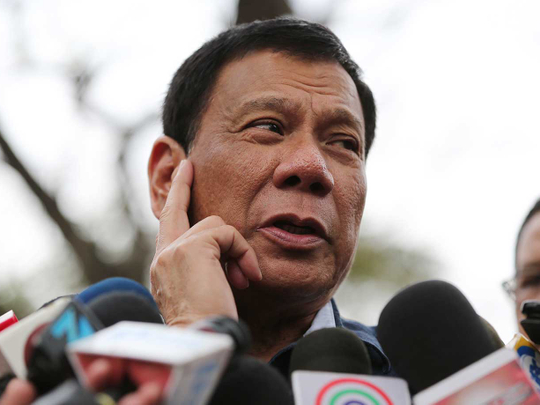
Manila: A plan by Philippine president-elect Rodrigo Duterte to restore the death penalty faces strong opposition, including from the dominant Roman Catholic Church, officials and analysts said Tuesday.
The tough-talking politician vowed Monday to introduce executions by hanging after he takes office on June 30 as part of a ruthless law-and-order crackdown that would also include ordering military snipers to kill suspected criminals.
After putting to death seven convicted criminals by lethal injection in 1999-2000, the Philippines abolished the death penalty in 2006 following stiff opposition from the Catholic Church, the religion of 80 per cent of Filipinos.
“As people of faith, we do not adhere to capital punishment because we do not have the right to judge who should live and who should die,” said Father Lito Jopson, head of the Catholic bishops’ communications office.
Duterte’s landslide May 9 election victory does not sway the bishops’ stance, Jopson told AFP.
"Philippines’ president-elect Duterte (second from right) talk with military and police officials during an informal meeting at a hotel in Davao City, in the southern island of Mindanao, on Sunday. Business titans, turncoat politicians, celebrities and rebel leaders are descending on the long-neglected far southern Philippines, hoping to gain favour with the nation’s shock new powerbroker. (Image Credit: AFP)"
“It is not based on popularity ... but rather on complete moral principles of the Catholic faith and faith demands we respect all persons’ human dignity,” Jopson said.
Duterte said he would ask Congress to reintroduce capital punishment for drug trafficking, rape, murder, robbery and kidnapping-for-ransom, among other offences.
While many newly-elected members of Congress have joined Duterte’s ruling coalition, passing such a law is by no means assured, political science professor Javad Heydarian of Manila’s De La Salle University told AFP.
“Duterte at this point has tremendous political capital and crime-busting is the centrepiece of his campaign,” Heydarian said.
“But he will face major pushback by human rights groups, the Catholic Church and likely ... the outgoing President (Benigno Aquino), who once described his successor as a dictator in the making,” the professor added.
The plan itself is opposed by the Commission on Human Rights, an independent government body which Duterte cannot abolish and whose current officials he cannot replace. It reviews proposed legislation affecting civil liberties.
“We will do our best to lobby against the reimposition of the death penalty,” said Banuar Falcon, chief of the commission’s international division.
Leni Robredo, who is leading the nearly completed electoral count for vice president, also said Tuesday she opposes capital punishment.
And the local office of human rights monitor Amnesty International said it would call on other rights groups to lobby Congress and educate the public against bringing back capital punishment.












